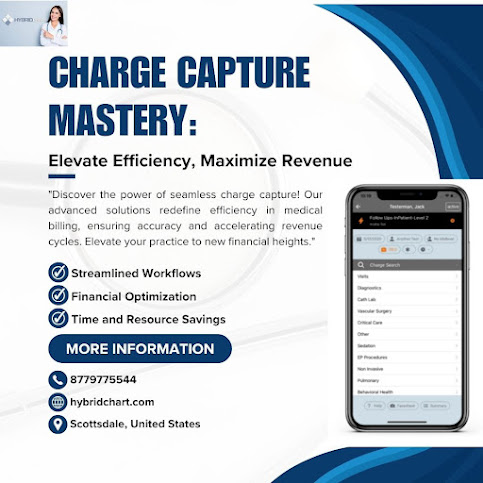Maximizing Revenue and Efficiency: Unveiling the Power of Hospital Charge Capture Best Practices and Software
In the ever-evolving landscape of healthcare, the optimization of revenue cycle management is paramount for hospitals. Among the key elements in this process, charge capture stands out as a critical aspect that can significantly impact a hospital's financial health. This blog explores the importance of charge capture, the role of charge capture software, and the best practices that hospitals can adopt to enhance their revenue cycle.
Understanding Charge Capture:
Charge capture refers to the process of accurately recording and billing for the services provided by healthcare professionals. In a hospital setting, this involves documenting the various procedures, tests, and services delivered to patients. The accuracy of charge capture directly influences the revenue generated by the hospital, making it a crucial component of financial success.
The Challenges of Manual Charge Capture:
Historically, charge capture was a manual and paper-based process, leaving room for errors and inefficiencies. Healthcare professionals had to rely on memory and handwritten notes to document the services rendered, leading to potential inaccuracies and missed charges. This not only affected the hospital's revenue but also created compliance issues.
Enter Charge Capture Software:
In response to the challenges posed by manual charge capture, hospitals have increasingly turned to technology for solutions. Charge capture software has emerged as a game-changer, streamlining the process and minimizing the risk of errors. These specialized software solutions are designed to automate and enhance the charge capture workflow, providing a more efficient and accurate method of documenting patient services.
Advantages of Charge Capture Software:
Accuracy and Compliance: Charge capture software ensures that every service provided is accurately recorded, reducing the risk of underbilling or overbilling. This not only optimizes revenue but also enhances compliance with regulatory requirements.
Real-time Updates: Unlike manual methods that may involve delays in data entry, charge capture software enables real-time updates. This allows for prompt billing and a more responsive revenue cycle.
Integration with Electronic Health Records (EHR): Many charge capture solutions seamlessly integrate with EHR systems, facilitating a cohesive and comprehensive patient record. This integration enhances communication among healthcare professionals and improves the overall quality of care.
Data Analytics: Charge capture software often includes robust analytics tools, providing valuable insights into hospital operations. Administrators can analyze trends, identify areas for improvement, and make informed decisions to optimize the revenue cycle.
Hospital Charge Capture Best Practices:
While adopting charge capture software is a significant step towards efficiency, hospitals must also implement best practices to maximize its benefits. Here are some key best practices for hospital charge capture:
1. Staff Training:
Ensure that healthcare professionals are well-trained in using the charge capture software. Proper training minimizes errors and ensures that all relevant services are documented accurately.
2. Regular Audits:
Conduct regular audits of the charge capture process to identify any discrepancies or trends. This proactive approach allows hospitals to address issues promptly and maintain compliance.
3. Continuous Improvement:
Charge capture is an evolving process. Hospitals should continuously evaluate and update their workflows to adapt to changes in healthcare regulations, coding practices, and technology.
4. Collaboration and Communication:
Encourage open communication among healthcare professionals involved in the charge capture process. Collaboration ensures that all services are captured, and any issues are addressed promptly.
5. Patient Engagement:
Incorporate patient engagement strategies to capture services that might otherwise be missed. Educate patients about the importance of providing accurate information regarding their symptoms and the services they receive.
Mobile Charge Capture for Enhanced Flexibility:
In the era of smartphones and mobile technology, the concept of mobile charge capture has gained prominence. Mobile charge capture allows healthcare professionals to record services on the go using their mobile devices. This not only enhances flexibility but also reduces the chances of missed charges, as healthcare providers can document services in real-time, even outside the traditional clinical setting.
Conclusion:
In the dynamic landscape of healthcare, optimizing revenue cycle management is essential for the financial well-being of hospitals. Charge capture, supported by advanced software solutions and best practices, plays a pivotal role in achieving this optimization. Hospitals that embrace the efficiency of charge capture software, along with implementing best practices, can ensure accurate billing, maintain compliance, and ultimately enhance their overall financial health. As technology continues to advance, the seamless integration of charge capture solutions will be instrumental in shaping the future of healthcare revenue cycle management.

Comments
Post a Comment